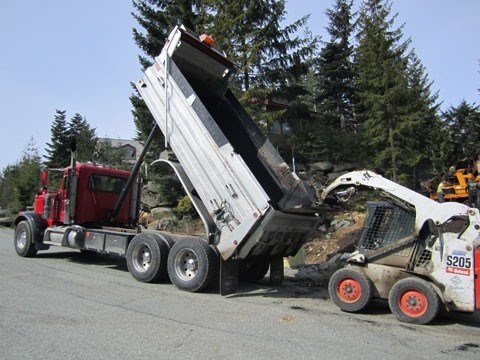The owner of Whistler's asphalt plant is finally telling his side of the story.
Frank Silveri, owner of Whistler Aggregates, who has steadfastly maintained a silence throughout his battle with the Resort Municipality of Whistler (RMOW), is now fighting back through the courts. And the long and short of it is: he says he's allowed to operate his plant on the fringe of the new Cheakamus Crossing neighbourhood.
In a response to the RMOW's petition, filed on Tuesday, July 12 in the Supreme Court of British Columbia, Silveri's lawyer Charles Willms said in court documents:
"For nearly 15 years Whistler Aggregates has manufactured and processed gravel and aggregate into asphalt on the Property with the express approval of the RMOW."
The documents continue: "The RMOW has repeatedly and publicly encouraged, patronized, and endorsed Whistler Aggregates and the operation of the asphalt plant on the Property, with the intention that its words and conduct would be acted upon by Whistler Aggregates."
At the heart of the issue is the question of zoning.
The RMOW, with the backing of the majority of council, claimed the zoning does not allow for asphalt production
When reached on Tuesday, the day the response was filed in court, the municipality's communications team said it had not been informed of the response and did not have a copy.
Staff and council have repeatedly said that the matter is before the courts and therefore they are unable to comment.
Silveri in his court filings, however, uses previous comments from Whistler's Mayor, Ken Melamed, and now-retired Chief Administrative Officer, Bill Barratt, to back up his position against the municipality.
"For example, on June 29, 2010, the Chief Administrative Officer of the RMOW, Bill Barratt, publicly states that the 'bottom line is the asphalt plant is a permitted use in the IPI zone... I just deal in fact, no emotion. It's fact: The IP1 zone permits the asphalt plant use.'
"Similarly, RMOW Mayor Ken Melamed commented at the regular council meeting of the RMOW municipal council on May 18, 2010, 'that the current language in the IP1 zoning cannot be used to compel and asphalt plant to move.'"
That has No Asphalt Plant spokesperson Tim Koshul shaking his head.
"I think these guys shot off their mouths, and they're incorrect," said Koshul.
He added that in his two years of his own investigation into the issue, he has never seen proof in the zoning that the asphalt plant is an allowed use.
Whistler Aggregates' response in court is the latest step in the battle of the Cheakamus Crossing residents, and the majority of council, against the operator of the asphalt plant.
The plant has long operated in the south end of town, for years beside Whistler's landfill and sewage treatment plant.
That all changed with the 2010 Olympic Games when the RMOW built the athletes' village on the landfill and later sold the housing to Whistler employees.
In April this year, the municipality issued a cease and desist order to Whistler Aggregates from using the plant after May 13. That date came and went and still the plant remains operational.
On June 20, the RMOW submitted a petition to the court to have the plant declared in contravention of the municipal zoning bylaw, and therefore prohibited from operating and required to move.
In that petition, municipal lawyer R.J. Randall Hordo claims:
"The manufacture of asphalt is not a permitted use of land in the IP1 zone."
Silveri's lawyer Willms, however, sees the zoning bylaw in another light.
He claims the court must look at evidence of the RMOW's conduct and its own previous interpretation of the Bylaw.
He adds that as far back as 1997, Whistler Aggregates "was advised by the RMOW that the zoning for the Property (the IP1 Zone) permitted the manufacturing and processing of gravel and aggregate into asphalt."
He uses Whistler's Official Community Plan (OCP), among other documents, to back up his position, claiming that the OCP recognizes the existence of the asphalt plant and that it would not be encouraged to move until the RMOW created a new heavy industrial area.
Ultimately, Willms claims that the RMOW's petition should be dismissed or referred to trial.
"Whether or not the RMOW has acted in bad faith, in the municipal law sense, is a question of mixed fact and law, the resolution of which requires a trial on the merits."
For Koshul, in Cheakamus Crossing, the potential to drag out the issue in a trial is not welcome news.
"This thing should be dealt with in September and the plant should be moved," he said.
In addition to the response to petition, Whistler Aggregates' lawyer also submitted a sworn affidavit from Frank Silveri.
In the meantime, the RMOW has a contract in place with Silveri's Squamish plant to provide asphalt for the 2011 municipal road works program.
None of these facts have been proven in court.




